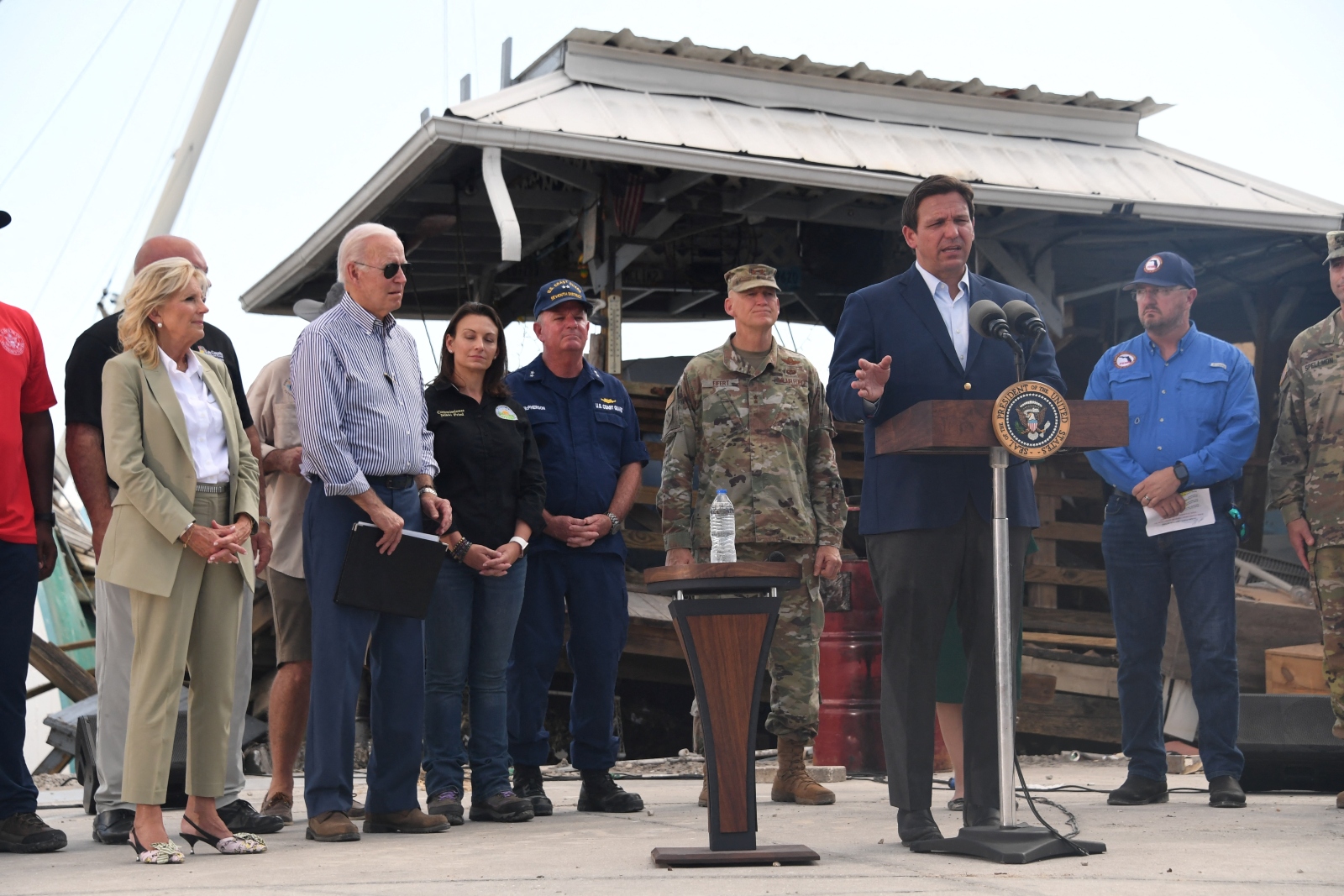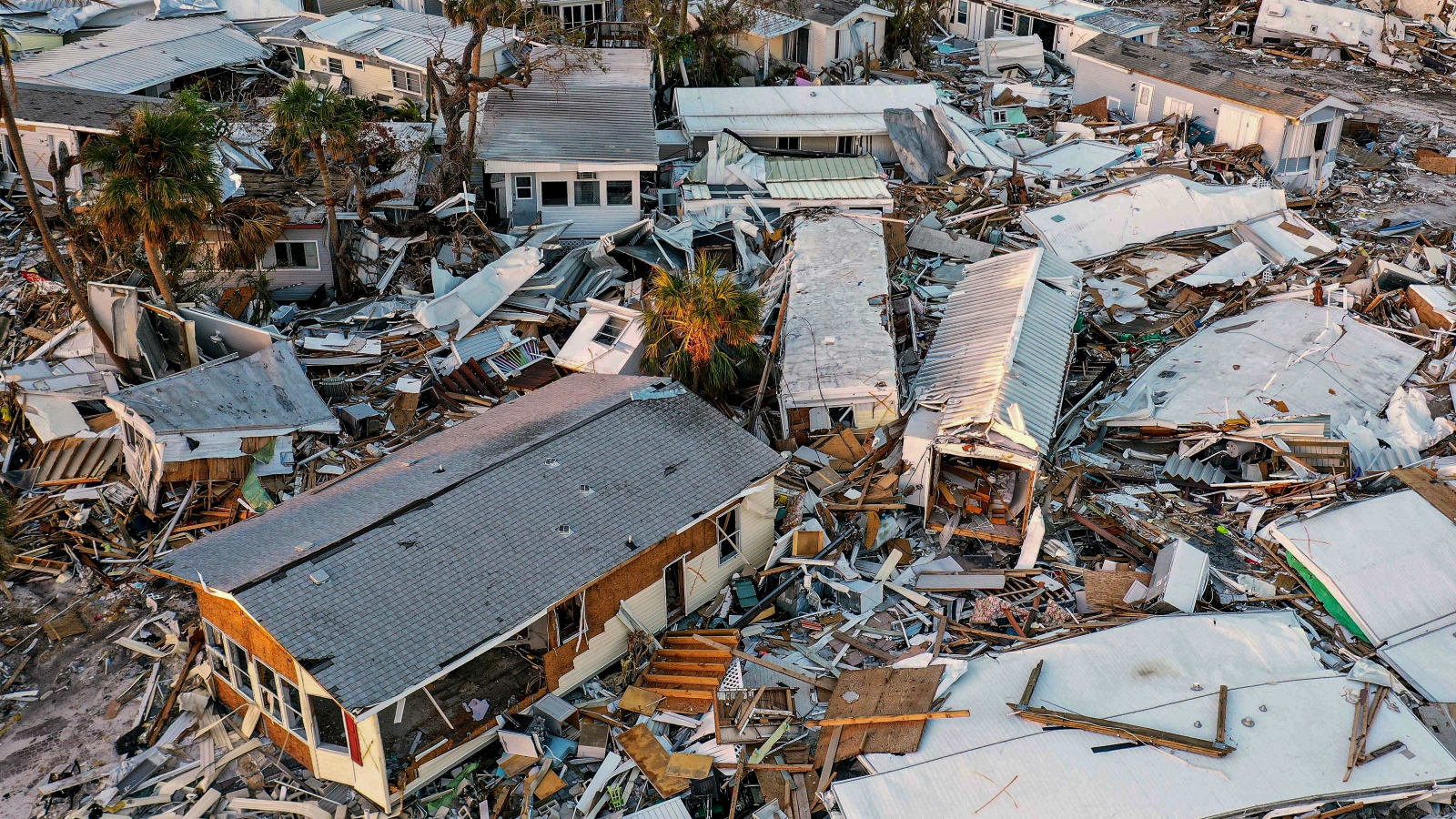In the three months since Hurricane Ian struck Florida, the state’s fragile property insurance market has been teetering on the brink of collapse. The historic storm caused over $50 billion in damage, more than any disaster in U.S. history other than Hurricane Katrina. It also dealt a body blow to an industry that was already struggling to stay standing: Several insurance companies had already collapsed this year even before the hurricane, and major funders are now poised to abandon those that remain.
In recognition of this crisis, Florida Governor Ron DeSantis convened the state’s Republican-controlled legislature last week for a special session devoted to stabilizing the insurance market. In a matter of days, lawmakers passed a package of bills aimed at doing so. The package includes bills that will cut down on litigation and fraudulent claims that raise costs for insurers, but it also provides insurance companies with a $1 billion public subsidy to help them stay afloat next year. That’s on top of another $2 billion the legislature rolled out earlier this year.
One might think that this handout would be opposed by a legislature where Republicans enjoy supermajorities in both chambers — and by a governor who has styled himself a future leader of the Republican Party — but the state’s lawmakers don’t have many other options. DeSantis may trumpet Florida as a free-market success story, but the insurance market has all but abandoned it.
The problem is that taxpayers will end up footing the bill for all this, even if they don’t own homes that are at significant risk — or don’t own homes at all.
“If the state has to step in every year to help insurers stay in the market, that’s a problem, unless everyone in Florida is willing to keep paying more and more as these events occur,” said Patricia Born, an academic at Florida State University who studies risk management. DeSantis and his allies in the legislature can shift the cost burden from risky insurance customers to taxpayers or vice versa, but they can’t get rid of that burden altogether.
In a typical market, property insurance companies take in money from all their customers’ premiums and pay out to the subset of customers whose homes suffer damage. The revenue from premiums is supposed to guarantee that a company can pay out customers even under the most catastrophic circumstances. But that has become impossible for most Florida insurers to do: A huge share of homes in the state are vulnerable to hurricanes, which leave insurers liable for massive payouts — and the specter of climate-change-driven effects like “rapid intensification” means that storms that might once have petered out before landfall can suddenly become devastating. Insurers in the state have also seen a surge of costly litigation over roof damages thanks to a Florida-specific legal loophole.
In theory, companies could raise prices to account for these costs, but in practice those prices would be too high for most customers to afford. Instead, many nationwide companies like State Farm have fled Florida altogether, leaving behind only small local carriers. When the crisis began after Hurricane Andrew in 1992, the state government created a public insurance company called Citizens that now serves as a provider of last resort to people who can’t get coverage from private companies. Citizens has doubled in size over the past four years as more of these companies collapse, and in some parts of the state it controls more than half of the insurance market.
In the weeks since Hurricane Ian, the biggest concern for the surviving private insurers has been the cost of reinsurance, which is insurance purchased by insurance companies. Just as a bank requires a homeowner to buy an insurance policy so she can cover sudden damages to her home, Florida requires insurers to buy their own insurance policies so they can afford to make big payouts after a storm.
Unlike the Florida-specific companies that currently sell home insurance to state residents, reinsurance companies are global corporations, many headquartered in Bermuda. These companies backstop the insurance markets in the world’s riskiest places, but the devastation from Ian is making many of the largest reinsurance providers cagey about operating in Florida. Industry analysts expect that these companies will pull as much as $100 billion of coverage off the Florida market next year, which could cause reinsurance rates in the state to rise by 10 percent or more.
When reinsurance gets more expensive, it spells trouble for small insurance companies like the ones that dominate Florida, said Sridhar Manyem, a researcher at the credit rating agency AM Best and the co-author of a recent report on the Florida market.
“They might have to drop some customers, they might have to raise rates, they might have to borrow more money at a pretty atrocious cost to buy reinsurance,” Manyem told Grist.
This situation could get out of hand fast. Florida’s property insurance premiums are already about three times higher than the national average, and analysts expect them to rise another 20 or 30 percent next year. Companies that can’t raise more money through loans or price hikes will collapse, forcing more people to join Citizens. As that public insurance program keeps growing, it will get more vulnerable to a big storm, potentially putting the state on the hook for billions of dollars that it will have to raise from taxes.

The state legislature approved a few measures last week that are designed to stop this downward spiral. One measure eliminates the unusual attorney’s fees that are driving the surge of roof litigation, a change lawmakers hope will help tempt insurers back to the market. Another measure would force every Citizens customer to buy flood insurance (even if they aren’t in a flood zone), and a third will slow down the growth of Citizens by requiring some potential customers to buy private insurance instead, even if it means they pay more. (Democrats in the legislature decried the lack of financial assistance for residents who face these new mandates.)
But the elephant in the room is the looming rise in reinsurance prices, which will make it even harder for Florida insurers to turn a profit next year. Reinsurance costs account for about half of the actual premiums that Florida homeowners pay, and that number is likely to rise.
“Right now that doesn’t look really good for any major carriers that might be thinking about writing in Florida, or even carriers that have been writing and might be thinking about leaving,” said Born.
Florida’s government has been propping up the primary home insurance market for decades, but the toll of weather disasters is forcing the state’s conservative government to go even further by propping up the reinsurance market as well. The state already maintains a $17 billion reinsurance fund that helps insurers cover the largest hurricane claims, but Ian will just about wipe that fund clean. Refilling it before next hurricane season will not be easy. Earlier this year the state created an additional $2 billion reinsurance fund, and lawmakers added another $1 billion fund last week, pumping more money into the languishing market to protect the remaining private carriers.
Top Republicans in the state have tried to frame the public funding as a stopgap measure.
“It would be temporary, and it has to be contingent on getting major reforms so we actually fix the situation,” Paul Renner, the incoming speaker of the state House of Representatives, told reporters last month before the special session. “I do not want to be in a situation where we make any kind of new long-term taxpayer commitment to underwrite insurance.”
But funding a long-term solution to the insurance gap may be easier said than done. Even if the new package of bills does solve the litigation issue, hurricane risk is only going to increase as more people move to coastal cities and warm oceans make landfalling storms more powerful. As long as that trend continues, it will be difficult if not impossible for lawmakers to engineer a functioning private market.
That means that the state government, and by extension state residents, will foot the bill for protecting billions of dollars in vulnerable property. Unless something changes, a “long-term taxpayer commitment” is all but a certainty, and that burden will fall hardest on the Floridians with the least resources.




